Despite the aggressive, vibrant lighting up and down the Las Vegas strip, there’s a calm afforded to residents of Sin City, catching their breath on the desert’s outskirts. In its many casinos, those doe-eyed gamblers that chase success with every roll of the dice, face elation and heartbreak in equal measure. You win some, you lose some. It’s that school of thought that translates directly to another of the city’s money-spinning attractions – prizefighting.
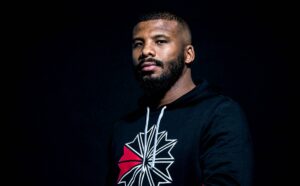
When assessing the storied career of former two-weight world champion, Badou Jack (22-2-3, 13KOS), it’s key to remember he’s bigger than just boxing.
The son of a Swedish mother and a Gambian father, Jack represented the latter as an Olympian in 2008, carrying the African nation’s flag during the opening ceremony. He is a practising Muslim, a father to two young children and a husband, to wife of five years Yasemin, balancing responsibilities despite spending time away from his home in Vegas during camp or at the launch of his new promotional company. Throw in the running of his own supplement company, Ripper Nutrition, for good measure.
On top of an existing, hectic workload, Jack had recently launched his most ambitious project to date, looking to change as many lives as possible on a global scale for those struggling to attain food or clean water. He’s not quite your stereotypical fighter. When discussing the Badou Jack Foundation during an exclusive interview with Boxing Social, he revealed more on their work with refugees across the Middle East.
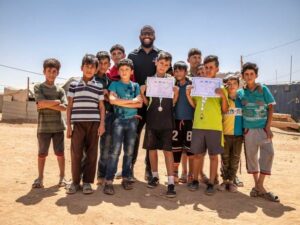
“First of all, as a Muslim, it’s my duty to serve people less fortunate, you know? That’s something I have always wanted to do and I have a great team and business manager, Amer Abdallah who was a former kickboxing world champion, he’s a good friend of mine. We started together to give kids all over the world a fighting chance in life. Whether it’s help with food or whatever else we can do. We work with a Syrian refugee camp and a Palestinian refugee camp, we do some work in Gambia and we focus mostly on kids.
“I have my nutritional company, Ripper Nutrition, so we provide all the kids in the refugee camps with a nutritional meal replacement drink. They aren’t able to feed themselves properly, so they’re gonna get all the vitamins and nutrients and stuff. We already have the supplement company, so everything goes straight to them [in the camps]. It’s 100% for the kids. I mean, they’re refugees, so without money or nothing [they would struggle].
“Ripper Nutrition has two supplements at the moment, we have amino acids and we have a post-workout, but we created a separate drink just for them. We did blood tests, it’s specific for refugee kids.”
Initially launching the foundation after his contentious draw with Adonis Stevenson last May, ‘The Ripper’ had been keen to make a difference after encountering dreadful living conditions in Jordan and more specifically, the Zataari refugee camp which was purpose-built for over 80,000 fleeing Syrians. They have started work in Gambia, as well as maintaining a focus on Palestinian and Syrian refugee groups, supplying their own brand of meal replacement shakes. The goal was to take the Foundation worldwide, but as Badou explained, he would ‘take it one step at a time, just like my boxing career’.
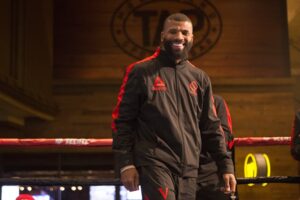
The last time we’d watched him compete between the ropes, he battled Staten Island’s Marcus Browne, struggling with an enormous gash that would have been welcomed on the set of a horror film. It was the result of accidental headbutt, something that Jack is sure changed the direction of the fight.
Wearing a mask of his own blood and with his forehead looking unzipped, he rallied and made it to the judges’ scorecards – despite losing convincingly for only the second time in a career now remarkably spanning twenty-seven fights. The former light-heavyweight and super-middleweight world champion had come up short, leaving detractors questioning his future in the sport at the age of thirty-five.
“I’m not supposed to lose to a guy like that [Marcus Browne]. It is what it is, the headbutt was really bad and I couldn’t see, basically. It was hard. I’ll be back stronger, it’s not a problem. My preparation was great, something happened after the weigh-in, I don’t really wanna talk about it or make no excuses, but preparation was great. We just had some minor issues after the weigh-in.”
He continued, detailing his plans for the remainder of the year, “I’m looking for, probably a tune-up fight. If I can’t get a rematch, then a fight in September or August, maybe. I’d love to get out because my cut is healing now and I should be good by then. I mean, style-wise, maybe not [the rematch], but of course I wanna avenge my loss. I’m not supposed to lose to a guy like that, no disrespect to him but the cut messed up everything, but it’s all good. I don’t know, he was holding a lot and that’s his style, but that’s okay. You live and you learn, I just gotta get stronger with it.”
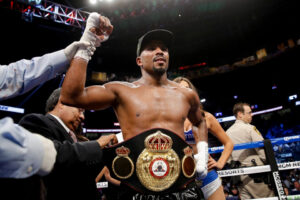
“Of course, that’s the plan [to win world titles again]. At light-heavyweight or cruiserweight, that’s the plan. Or both, maybe. I’m gonna see what my team has for me next, I’ve had a lot of tough fights – six world champions back-to-back and then Marcus Browne, undefeated. It’s all about fighting the best, I’m ready to get back in there.”
Continuing his recovery, the Swedish history-maker had come a long way from training in the ice-cold gyms of his native city, Stockholm. His achievements are remarkable having only fought as an amateur from the age of eighteen.
Speaking to Jack wasn’t like speaking to any other fighter. He carried himself calmly and with an unreserved air of cool. As he discussed the sport, he was laid back, but thankful for the opportunities he had been afforded. It wasn’t over yet, he explained, but it wasn’t far away. His involvement in the promotional side of the game was another fresh venture, however he had been learning from one of the sport’s pioneers.
Ahead of Badou Jack Promotions’ debut event in Dubai on May 3rd, he was using tips picked up from his mentor and his own promoter, Floyd Mayweather Jr, expanding the Swede’s empire and ensuring longevity after fighting reaches its conclusion. With his profile ever-expanding, he was of the opinion that the timing was perfect. The event will be headlined by talented British cruiserweight, Viddal Riley, though Badou revealed that he may be joined by some of his domestic compatriots.
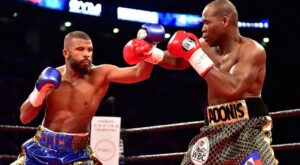
“Right now, we have Badou Jack Promotions that we just started. So, on May 3rd, we have our event in Dubai and that’s our first show there. We have Vidal Riley [headlining], he’s a good kid and as very talented guy. We’re gonna finalise the whole card in the next week or so. There might be some more British fighters, I’m not sure.
“I learned a lot from Floyd, being around him for all of these years. I was thinking, I’d spent a lot of time in Dubai but boxing wasn’t really big there. They have money there and it’s kinda like the Las Vegas of the Middle East. I told my partner Amer, ‘Let’s make something happen and let’s make boxing big here’. The competition in the US and the UK is big, so over there it’s not really got any competition. Why not start there and see how it goes? The plan is to expand, as I said the best boxing fans in the world are in the UK, so who knows? Maybe one day we could do a show there, too.”
The entrepreneurial streak displayed time-and-time again by Badou was impressive for a man dedicated to his craft, throwing hours into the gym during preparation. Boxing had been good to him, but in setting up these different initiatives, he’s used the sport to secure a life after fighting. His name carried weight, whilst his image was clean-cut.
Jack had returned from defeat, losing to Derek Edwards in a single round, capturing world titles and playing an active part in unification fights, remaining unbeaten in world title clashes. A slow starter, he had been involved in some of the biggest fights of the last five years. Although he appears to have some bouts left in the tank, bowing out would be on his terms – a rarity in our sport.
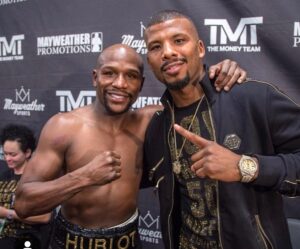
Jack’s introduction to boxing in Sweden had occurred later than most. He was the only two-weight world champion the country had produced, despite having titlists such as Ingemar Johansson and Armand Krajnc. The switch to represent his paternal heritage at the peak of amateur boxing in Beijing had come organically, as he explained when looking at his first steps in a celebrated career.
“I mean, I always liked boxing. My friends brought me to the gym and I’ve been training hard since that first time I stepped into the boxing gym. I was like, seventeen years-old or eighteen years-old. I got into it quite late but I always loved boxing. I took it one fight at a time and I was just working hard. I was always [only really] interested in boxing – I guess I was a born fighter! I feel like I still got some years left, too.
“I fought for Sweden my whole career, but the Olympic games 2008 was supposed to be my last one before I turned pro. Actually, at the World championships in 2007, I represented Sweden. That was qualification for the Olympics and I didn’t qualify. After that, I thought, ‘Why not make my dad proud and represent Gambia?’ I mean I’m half-Gambian and half-Swedish. Why not try and represent them?”
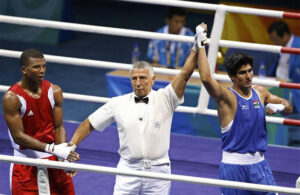
“They loved it and in the opening ceremony I carried the flag for them [Gambia]. I ain’t have no issues like that [with racism] in Sweden, maybe if I was 100% Swedish they would probably have supported me a little more, but they supported me pretty good. People know better than to mess with me. I never had no problems.”
Two men who knew better than to mess with Jack were former British opponents, George Groves and James DeGale. The latter left with some of his teeth in a bag, whilst Groves suffered a devastating defeat in Vegas – one of his tougher outings.
Both former world champions, they had recently retired from the sport after defeats in September [Groves v Smith] and February [DeGale v Eubank Jr], having also faced each other for the British title in 2011. I’d been keen to find out Jack’s thoughts on his mutual opponents following their decision to hang up their gloves.
“Both of ’em had pretty good careers. I think probably James DeGale [had the better]? He had the better wins but both of them were good fighters and I wish them both the best in retirement. This is a tough sport. It’s nothing personal for me, I know they had a beef with each other but this is business for me. We’re just trying to feed our families. You might try to knock each other out inside the ring, but after that we’re cool.”
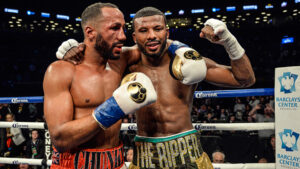
“DeGale’s was a flash knockdown [when he fought me], I came on strong and I wasn’t hurt or nothing. You could see in our next fights, he fought [Caleb] Truax and I fought [Nathan] Cleverley, you could see who took the most punishment in our fight. But Groves was a tough fight, too. After I dropped him in the first round, I lost my gameplan a little bit, but I thought I won clearly. I’d probably say Groves was my tougher fight, but they’re very equal.”
Despite his peers deciding to walk away from those gruelling camps and brutal fights, it wasn’t quite his time yet. Whether his future was at light-heavyweight or cruiserweight, Badou was keen to chase the biggest fights and return to the top of his chosen division. Although he is now juggling many different responsibilities, it was boxing that remained his priority. A return in the Autumn of 2019 looked likely, allowing himself precious time to recover physically.
When discussing what was most important to him, he understood the magnitude of the Badou Jack Foundation’s work, focusing on giving children from war-torn regions the best possible chance at life. It would live on, long after he calls time on his glittering career inside the ring.

“If I could get a big fight at cruiserweight I’m down for that! Try to be a three-division world champion – that would be a dream. I’m gonna sit down with my team, once this cut heals a little more we’ll be back at it. I’m the first Swedish two-division world champion, but three would be even better.
“[I want people to think] that I fought all the best fighters. That I never ducked no challenges and I gave everything when I was in the ring. The foundation and the charity stuff, that’s bigger than boxing. We want to help as many kids as possible, to give them that fighting chance in life, it’s as simple as that.”
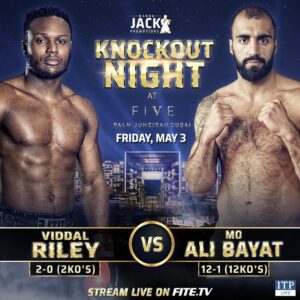
Order ‘Knockout Night’ here: https://bit.ly/2vqp4q6
Interview written by: Craig Scott
Follow Craig on Twitter at: @craigscott209